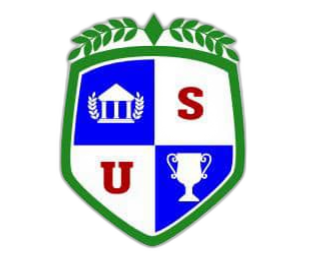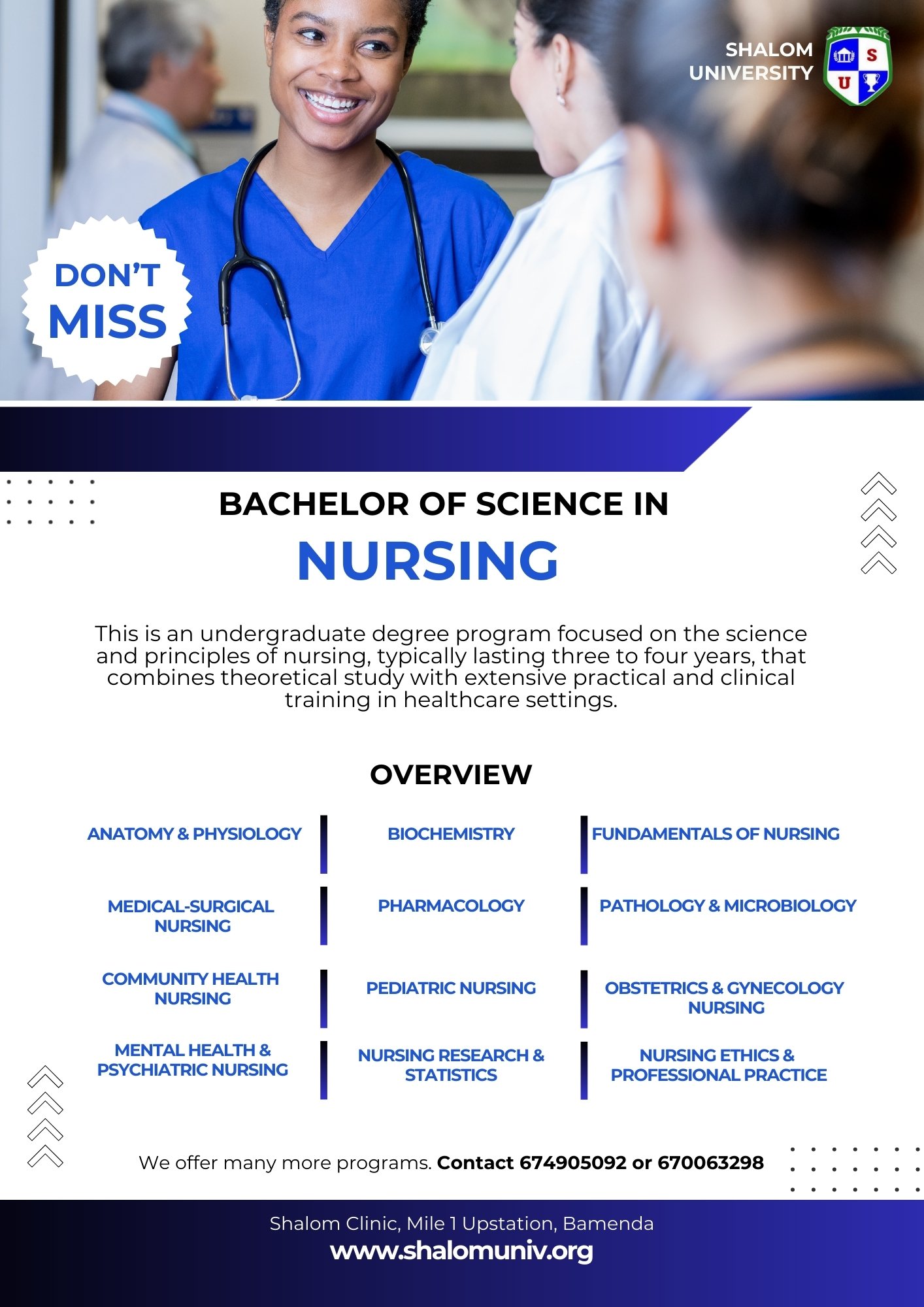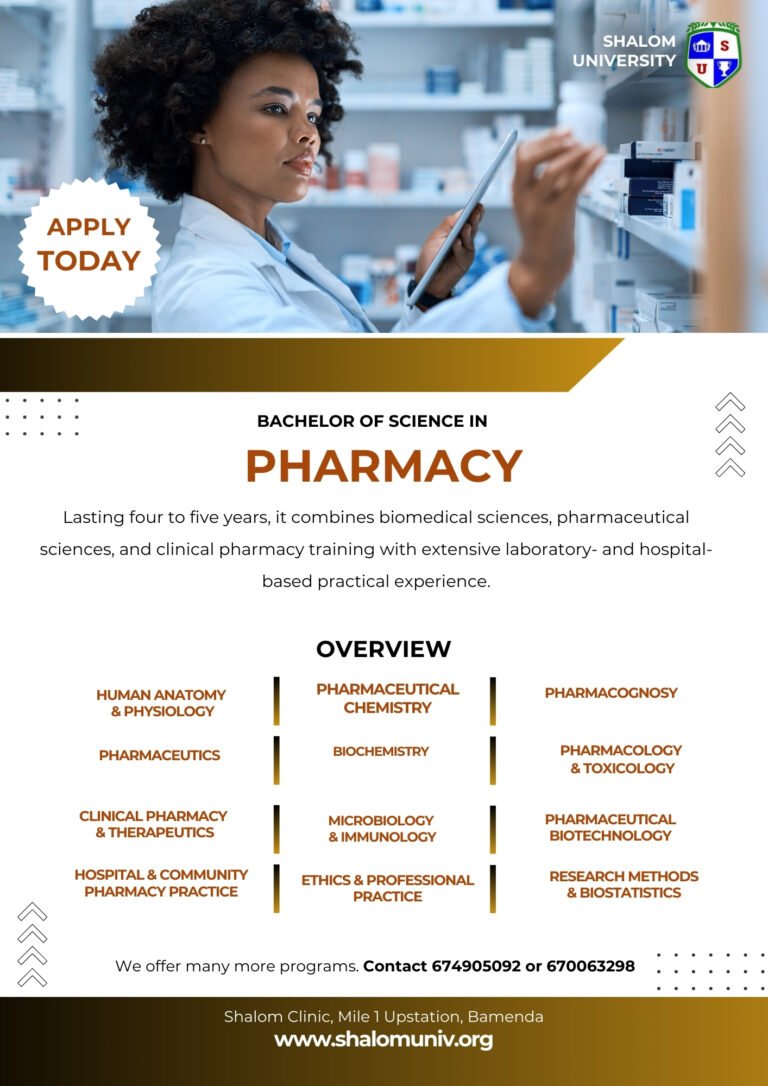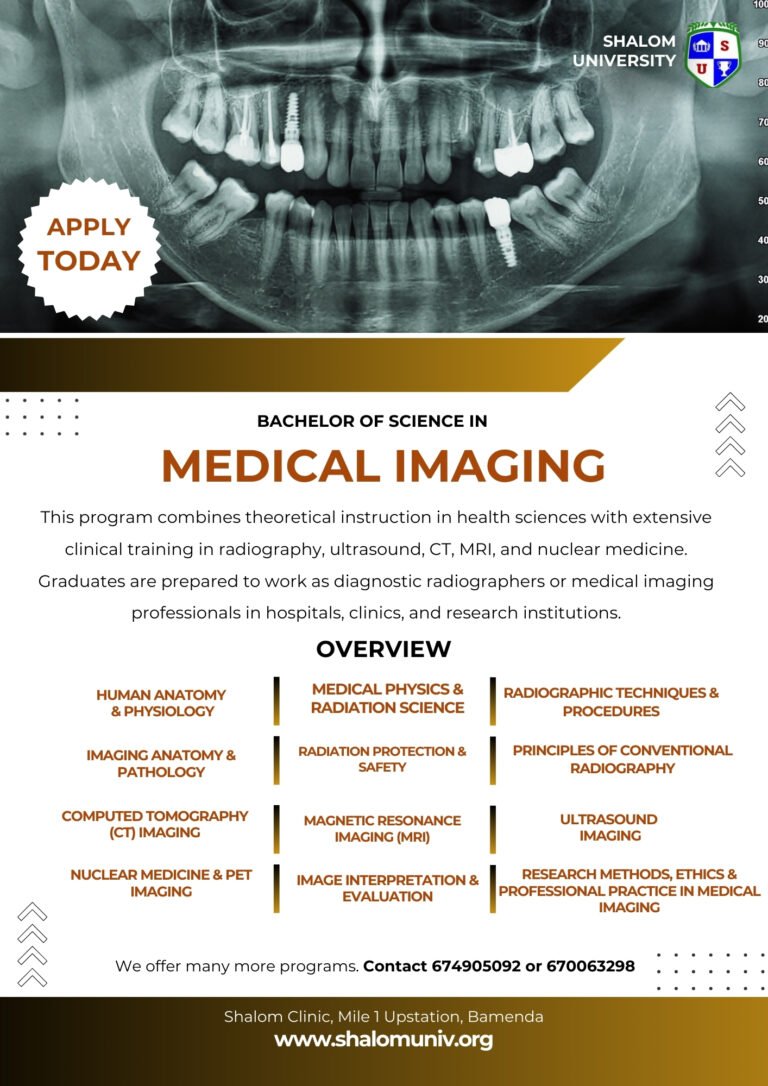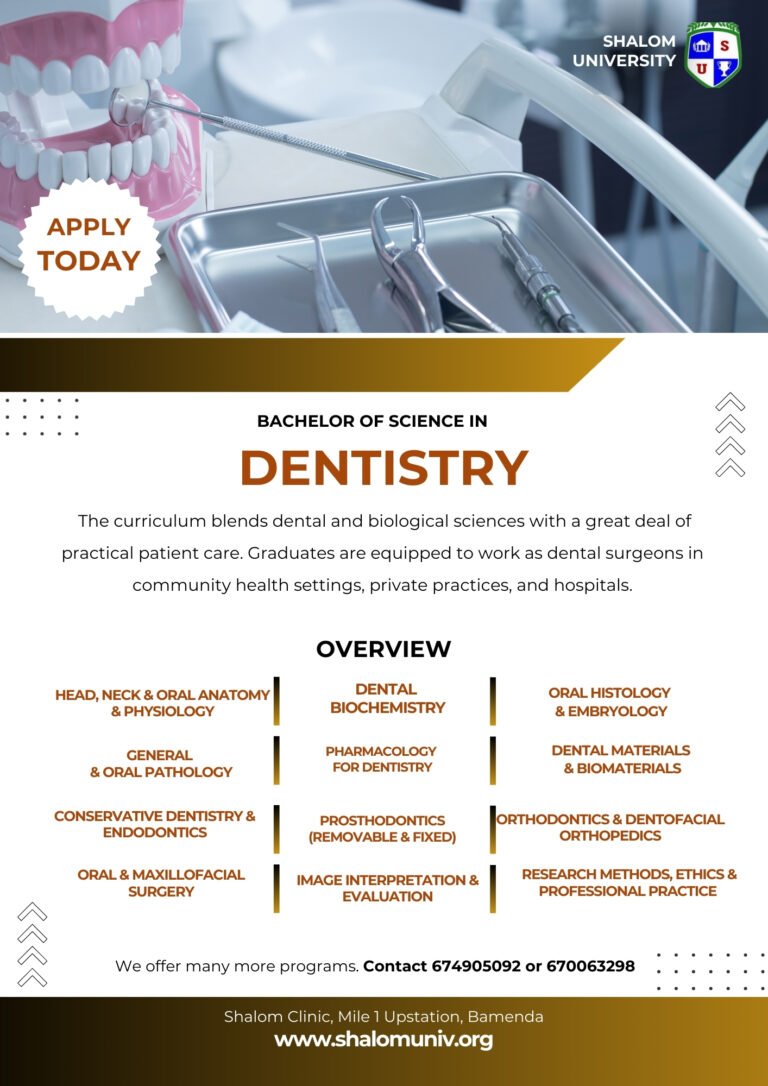Nursing is often called the heart of healthcare, and for good reason. Nurses are at the frontline of patient care, providing not only clinical expertise but also compassion, advocacy, and holistic support. In today’s dynamic health systems, nurses play a pivotal role in saving lives, promoting wellness, and ensuring that communities thrive.
At Shalom University, the Bachelor of Science in Nursing (BSc Nursing) equips students with a strong academic foundation, advanced clinical skills, and ethical values to serve in hospitals, community health centers, research institutions, and beyond. The program blends classroom instruction, laboratory practice, clinical rotations, and community outreach to produce competent, compassionate, and globally competitive nurses.
Below, we explore the key courses and highlights of the BSc Nursing program.
Anatomy & Physiology
Understanding the human body is the cornerstone of nursing education. This course covers body systems, organs, and physiological processes, enabling students to recognize normal and abnormal functions. With this knowledge, nursing students can link symptoms to underlying causes and make informed decisions in patient care.
Biochemistry
Biochemistry introduces students to the molecular basis of life, exploring enzymes, hormones, proteins, and metabolic pathways. In nursing, this knowledge helps explain disease processes such as diabetes or hormonal imbalances and supports evidence-based interventions in patient management.
Fundamentals of Nursing
This module is where students begin their journey into nursing practice. It covers essential skills such as patient assessment, communication, infection prevention, and basic care procedures. Students also learn about the nursing process—assessment, diagnosis, planning, implementation, and evaluation—which becomes the framework for all nursing practice.
Medical-Surgical Nursing
Medical-surgical nursing is a core area that focuses on adult patient care in both acute and chronic conditions. Students learn how to manage illnesses such as cardiovascular disorders, respiratory diseases, gastrointestinal conditions, and post-surgical recovery. This course emphasizes critical thinking, clinical decision-making, and multidisciplinary collaboration.
Pharmacology
Medication is a key component of patient care. This course provides in-depth knowledge of drug classifications, mechanisms of action, side effects, and safe administration practices. Students also learn how to calculate dosages accurately, counsel patients about medications, and prevent drug errors—a vital aspect of patient safety.
Pathology & Microbiology
Pathology introduces students to the study of disease processes and cellular changes, while microbiology focuses on infectious agents such as bacteria, viruses, fungi, and parasites. Together, these subjects prepare students to understand disease causation and apply infection control measures in both hospital and community settings.
Community Health Nursing
This course takes nursing beyond the hospital into public health and community wellness. Students engage with topics such as maternal-child health programs, immunization campaigns, health promotion, sanitation, and disease prevention. Community-based practice helps future nurses address the needs of underserved populations and improve health outcomes at the grassroots level.
Pediatric Nursing
Children require specialized care that considers growth, development, and family-centered approaches. Pediatric nursing equips students with skills to care for newborns, infants, children, and adolescents, covering conditions such as malnutrition, infections, congenital disorders, and chronic illnesses. The course emphasizes compassionate, safe, and developmentally appropriate care.
Obstetrics & Gynecology Nursing
This module trains students to provide care across the reproductive health spectrum, from prenatal and antenatal care to childbirth and postpartum management. Students also gain knowledge of gynecological conditions, fertility management, and family planning. Skills learned here are crucial for reducing maternal and neonatal mortality rates in communities.
Mental Health & Psychiatric Nursing
Mental health is a critical but often overlooked component of healthcare. This course prepares students to assess, support, and manage patients with psychiatric and psychological disorders, including depression, anxiety, schizophrenia, and substance use disorders. Emphasis is placed on therapeutic communication, counseling, and destigmatizing mental illness.
Nursing Research & Statistics
Evidence-based practice is at the core of modern nursing. This course teaches students how to design studies, collect and analyze data, and interpret research findings. By learning research methods and biostatistics, students develop the skills to evaluate scientific evidence and apply it in clinical decision-making and policy development.
Nursing Ethics & Professional Practice
Nurses face ethical dilemmas daily, from patient confidentiality to end-of-life care decisions. This course equips students with knowledge of nursing ethics, professional standards, and legal frameworks. Students learn to advocate for patients while upholding professionalism, integrity, and accountability in practice.
Career Opportunities in Nursing
Graduates of the BSc Nursing program at Shalom University have multiple career pathways:
- Clinical Nursing Practice – Hospitals, clinics, and specialized care units.
- Community & Public Health Nursing – Health outreach, disease prevention, and primary care.
- Research & Academia – Nursing education, research, and policy development.
- Leadership & Management – Nurse administrators and health service managers.
- Global Health Organizations – NGOs, WHO programs, and humanitarian missions.
Graduates may also advance to postgraduate studies such as Master of Science in Nursing (MSN) or Doctor of Nursing Practice (DNP) for specialized and leadership roles.
Why Choose Shalom University for Nursing?
- Holistic Curriculum – Blending science, practice, ethics, and leadership.
- Hands-on Clinical Training – With rotations in partner hospitals and health centers.
- Expert Faculty – Nursing educators and practicing professionals.
- Community Engagement – Students actively participate in public health initiatives.
- Global Relevance – Curriculum aligned with international nursing standards.
For more details, visit the official page: Bachelor of Science in Nursing at Shalom University.
Frequently Asked Questions (FAQ)
Q1: How long does the BSc Nursing program at Shalom University take?
A: The program typically takes four years of full-time study, including classroom, laboratory, and clinical training.
Q2: What are the entry requirements?
A: Applicants need a high school diploma with strong grades in sciences (biology, chemistry, and physics). Additional requirements may apply for international students.
Q3: Is clinical practice included in the program?
A: Yes. Students complete clinical rotations in hospitals, clinics, and community health settings, gaining practical skills in real healthcare environments.
Q4: What career paths are available after graduation?
A: Graduates can work in hospitals, community health centers, research institutions, global health organizations, and educational institutions.
Q5: Why should I choose Shalom University for nursing studies?
A: Shalom University combines academic excellence, practical experience, ethical grounding, and community service, preparing graduates to lead in healthcare locally and globally.
Final Thoughts
The Bachelor of Science in Nursing at Shalom University is more than a degree—it’s a calling to make a difference in people’s lives. By combining scientific knowledge, clinical training, ethical practice, and compassionate care, this program shapes nurses who can transform healthcare outcomes in their communities and beyond.
Whether your passion lies in clinical care, community health, research, or leadership, this program provides the foundation for a rewarding and impactful career.
